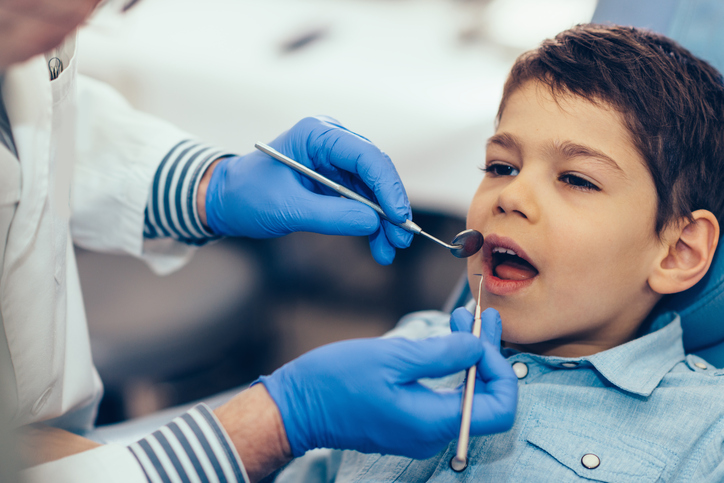While you may dread the dentist and be a little lacking in the flossing department, it’s important to help the kids in your life get off to the best possible start for a great smile. February is National Children’s Dental Month, a great opportunity to start or reinforce some healthy oral hygiene habits for the whole family.
According to the Centers for Disease Control and Prevention, nearly 20 percent of kids from ages 5 to 11 have at least one untreated cavity, which can not only cause discomfort and pain, but can also have repercussions on development and future dental health as an adult. However, tooth decay is preventable.
Here are a few tips to help set up your kids for a lifetime of healthy teeth –
- Visit the dentist early and often – Kids can start seeing a pediatric dentist once their first tooth appears, but should visit no later than their first birthday. Not only is it helpful to make sure those new teeth are as healthy as they should be, but it can help kids develop a relationship with the dentist and avoid future anxiety (as you may be all too familiar with!). From that point on, it’s typically recommended that kids see the dentist for check-ups every six months, but talk to your children’s dentist to discuss the best plan for them.
- Consider dropping the pacifier – Getting rid of the “binky” may be many parents’ worst nightmare, but long-term pacifier use past age 2 can have a negative impact on kids’ dental development. Along the same lines, try to avoid giving younger babies and toddlers a bottle at bedtime or in bed. The sugars that occur naturally in some beverages can contribute to decay if babies’ teeth are exposed overnight. Try to clean their teeth after their last bottle or nursing session of the day and stick to water if baby needs a bottle to fall asleep.
- Watch sugar intake – To help avoid tooth decay, help your kids choose healthy food and drink options that do not have high amounts of sugar in them, since sugar can lead to cavities. This is important even for young babies, as drinking juice and other sweet drinks through a bottle and even a sippy cup can contribute to early dental issues. Talk to your kid’s doctor or dentist if they are regularly taking flavored medicines that are high in sugar. You may need to take extra steps to help protect their new teeth from decay.
- Eat a healthy diet – In addition to minimizing sugar, incorporating plenty of fruits, vegetables and other healthy foods into your family’s meals and snacks can contribute to healthier teeth and gums, as well as overall well-being.
- Encourage healthy habits – Start a routine early on by brushing your kids’ teeth twice a day with a small amount of fluoride toothpaste. Help them start to take more responsibility for this habit as they get older, but work with them to make sure they are cleaning their teeth effectively. This can be started as soon as a baby’s first tooth appears, but before then, it’s recommended to clean baby’s gums with a clean, moist cloth.
- Be a role model – Kids learn by watching you! If your children see you brush and floss regularly, they are more likely to do the same. And you should also consider visiting the dentist regularly for cleanings and check-ups!
- Check for fluoride – The mineral fluoride is critical to strengthening tooth enamel and helping prevent tooth decay, especially for kids as their teeth are developing. Contact your local health department to confirm if fluoride is added to your area’s tap water. If not, talk with your children’s dentist about other ways to ensure your child is getting enough fluoride.
Establishing healthy dental habits when kids are young will go a long way to helping them maintain a healthy smile as they continue to grow.
How Health Advocate can help
If you are a Health Advocate member, your Personal Health Advocate can help find a pediatric dentist in your area and schedule an appointment (and maybe one for you as well!).
Other helpful resources
To learn more, please visit any of the websites below for additional information about children’s dental health:



